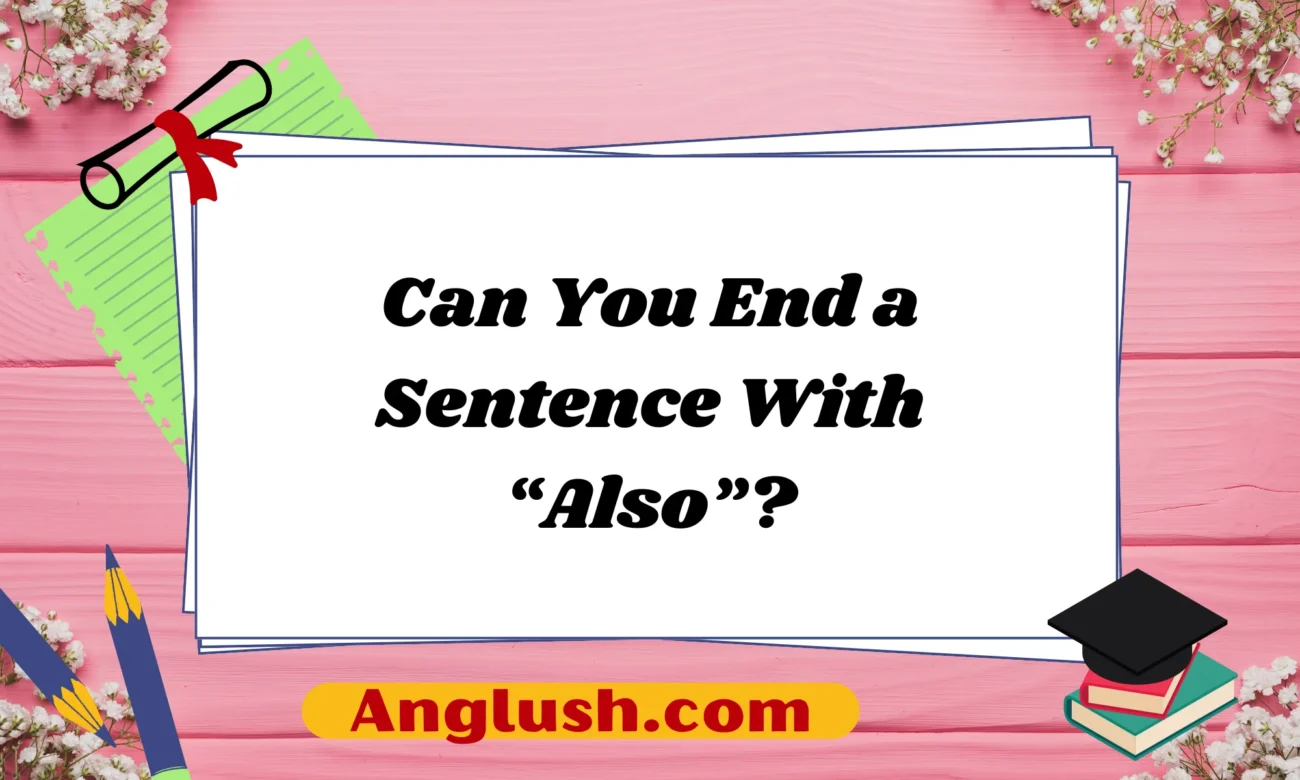Introduction
English is a flexible and dynamic language, allowing for various sentence structures and styles. One common question is whether it is acceptable to end a sentence with the word “also.” While grammatically correct, ending a sentence with “also” can sometimes sound awkward or informal.
This article explores the usage of “also” at the end of a sentence, provides alternative ways to express the same idea, and discusses the nuances of tone, formality, and clarity in communication. We will also include examples to illustrate different ways to phrase your sentences effectively.
Is It Correct to End a Sentence With “Also”?
Yes, you can end a sentence with “also” without breaking any grammatical rules. However, doing so can sometimes sound unnatural or leave the sentence feeling incomplete. Here’s an example:
✅ Correct but awkward:
- She enjoys hiking and camping also.
A more natural way to phrase this would be:
✅ Better alternative:
- She also enjoys hiking and camping.
When Is It Acceptable?
There are instances where ending a sentence with “also” works fine, especially in casual speech or informal writing:
- I’d love to join the meeting also!
- He’s coming to the party also.
However, in professional or formal writing, restructuring the sentence is usually a better choice.
Better Alternatives to Ending a Sentence With “Also”
If you want to maintain clarity and improve the flow of your writing, consider these alternatives:
1. Moving “Also” to the Beginning or Middle of the Sentence
Instead of placing “also” at the end, moving it to the middle or beginning often makes the sentence sound more natural.
✅ Examples:
- She also enjoys reading and writing. (instead of She enjoys reading and writing also.)
- Also, I’d love to join the meeting. (instead of I’d love to join the meeting also.)
2. Using “Too” or “As Well” Instead
“Too” and “as well” are smoother alternatives that can replace “also” at the end of a sentence.
✅ Examples:
- He’s coming to the party too. (more natural than He’s coming to the party also.)
- She enjoys reading as well.
3. Using “Additionally” or “Moreover” for Formal Writing
For professional or academic writing, “additionally” and “moreover” can replace “also” to create a more polished tone.
✅ Examples:
- Additionally, we need to consider the budget constraints.
- Moreover, she has years of experience in the industry.
4. Rewriting the Sentence for Clarity
Instead of forcing “also” into a sentence, restructuring can improve clarity.
✅ Example:
❌ The new software improves efficiency also.
✔ The new software also improves efficiency.
Examples of Polite, Professional, and Casual Alternatives
Polite Alternatives
- I’d love to help with the project as well.
- I appreciate your support too.
Professional Alternatives
- Additionally, we should review the report before submission.
- Moreover, the results indicate a positive trend.
Casual Alternatives
- I want to see that movie too!
- She’s bringing snacks as well!
Texting Examples for Everyday Use
Here are 10 examples of how you can phrase your messages to sound more natural while texting:
- Casual: I’ll be at the concert too!
- Casual: She’s joining us for dinner as well.
- Professional: Additionally, I’ll send the updated file shortly.
- Polite: I’d love to be included in the meeting as well.
- Formal: Moreover, the research supports our hypothesis.
- Friendly: Let’s grab coffee later too!
- Casual: I need to stop by the store as well.
- Professional: Furthermore, we should consider alternative solutions.
- Casual: I’m bringing dessert too!
- Polite: I appreciate your help as well.
Choosing the Best Alternative Based on Context
1. Formal vs. Informal Situations
- Use “too” or “as well” for casual conversations.
- Use “additionally” or “furthermore” for professional or academic settings.
2. Written vs. Spoken Communication
- In spoken English, ending a sentence with “also” is more acceptable.
- In written English, restructuring the sentence improves clarity.
3. Tone and Clarity
- “Too” sounds friendlier and is more commonly used in speech.
- “Moreover” and “furthermore” add a sense of formality.
Conclusion
While it is technically correct to end a sentence with “also,” it often sounds awkward or unnatural. Instead, consider using alternatives like “too,” “as well,” “additionally,” or restructuring the sentence for better clarity. Choosing the right phrasing depends on the context, whether formal or informal.
By using these alternatives, you can enhance the flow of your writing and communication, making it more polished and natural.

